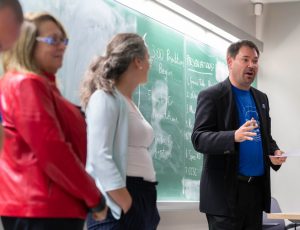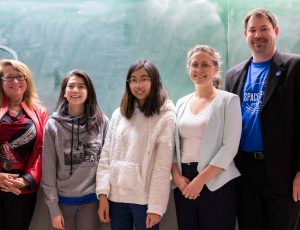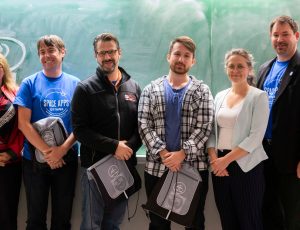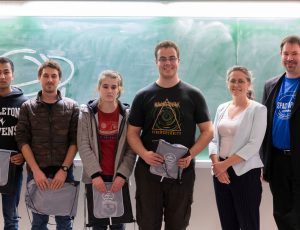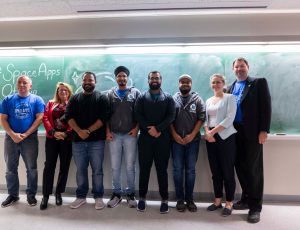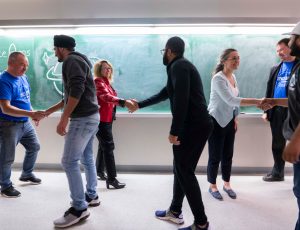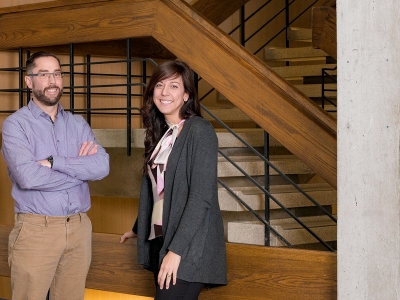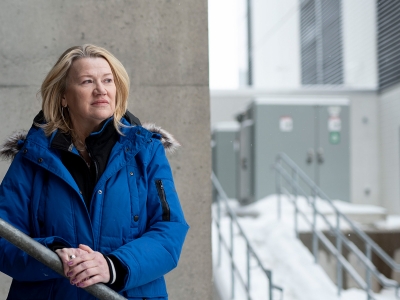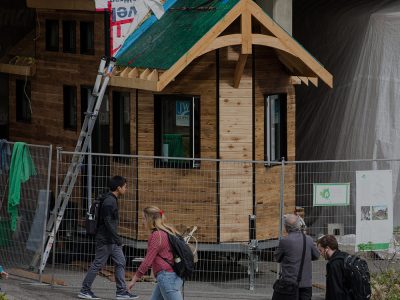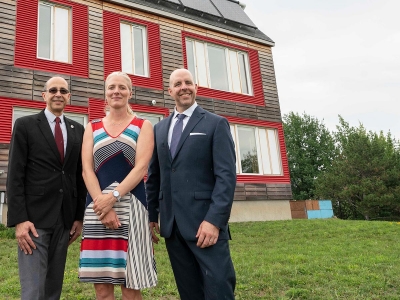By Elizabeth Howell
Photos by Chris Roussakis
Carleton and Ottawa-area students recently applied their data-plumbing skills to solve real-life problems in – of all locations – outer space.
Space Apps Ottawa brought 120 registrants in to solve problems presented by the Canadian Space Agency and NASA. The local winners will go on to regional competitions, with the chance to compete for global prizes in the coming weeks. Nine teams presented for the judging, resulting in four local winners:
- “Mooncake” (Katie Van and Priscilla Lo) won NASA challenge “The Art Side of the Moon” by creating a short animation about a child who is told a bedtime story about the moon and its residents.
- “Space XD” (Prabdeep Singh Pannu. Akash Gupta, Jerin, Jaskaran Bhambra) won NASA challenge “Show the World the Data” by using a website and mobile app to visualize NASA data about the Earth.
- “CCSC” (Christopher Bennett, Filipp Gorodnov, Komilljon Abhdurahimov, Emma Sewell) won CSA challenge “Go Canada – Geomagnetic Data Integration.” The team examined datasets that track Earth’s magnetic field and created a visual map of geomagnetic activity across the country.
- “Radarsat Liberators” (Kevin Jones, Alan Higginson, Adam Simonini, Nick Kellett) won CSA challenge “Radarsat-1 Open Data.” The team created a tool to help the CSA identify and prioritize datasets that could be useful for research.
The competition is also an opportunity for these budding programmers, data engineers and scientists to learn more about Carleton’s Technology Innovation Management (TIM) program — a graduate program that teaches technically-minded innovators how to create and grow their own businesses and commercialize innovation.
Space Apps Ottawa an Opportunity for Community Innovation
“Hackathons are a hotbed of innovation,” said Steven Muegge, an associate professor of entrepreneurship at Carleton’s Sprott School of Business and the director of the TIM program. “This event is exciting. It’s reaching out to the community, bringing in people with all sorts of skill sets and all sorts of interests. The space sector offers lots of opportunity for community innovation and for aspiring entrepreneurs.”
The competitors had just 48 hours to tackle one of several space challenges, create a viable working system, and present it to a team of local judges. Participants organized into teams with a variety of skill sets to interpret and use the data.
Some of the challenges tackled topics like searching for asteroids threatening Earth, interpreting radiation data collected by Canadian astronaut David Saint-Jacques during his recent mission in space, and designing affordable Internet access for populations living on ocean islands far from mainland services.
The Canadian Space Agency makes the challenge possible by opening up data from its missions, through the federal government’s Open Government program, which seeks to increase transparency and improve services because individual departments can be more responsive to the needs of Canadians. (Of course, exceptions are made in more security-focused environments.)
Local organizers brought in university and high school students to participate – which led to a team coming from John McCrae Secondary School in Barrhaven. The team created an interactive game for the “Rising Water” challenge of the NASA “Earth’s Oceans” category. The game visualized the impact of rising oceans on specific coastal cities. Team members included Xiaoran Zhang, Amani Farid, Liam Hamilton MacHale, Andrew Zhang, Rosa Li and Eric Huang.
The organizers plan to include more high school students next year, and to work toward gender parity.
Across the world in 2018, Space Apps drew 80,000 participants in 212 cities; the tally for 2019 is still being tabulated. Carleton’s TIM program was the venue sponsor for Space Apps Ottawa, with eight more sponsors chipping in for meals, drinks, event T-shirts, and other essentials for local participants.
Thursday, October 24, 2019 in Faculty of Engineering and Design, Sprott School of Business
Share: Twitter, Facebook
